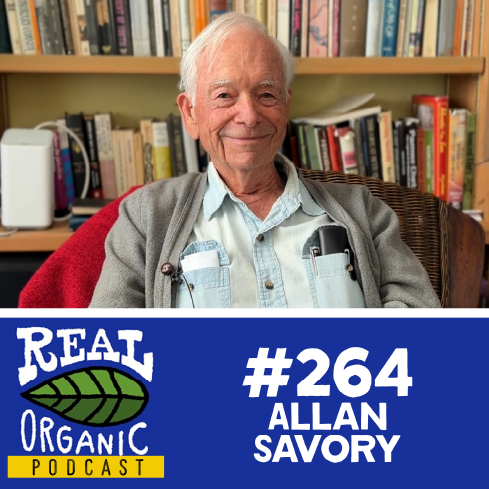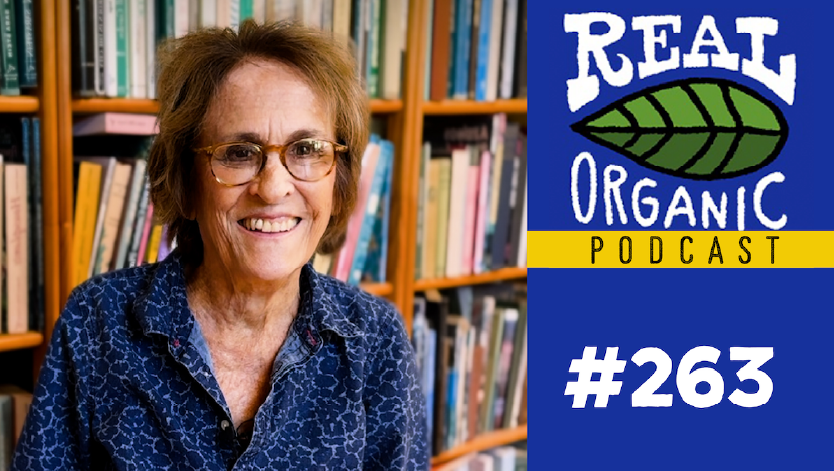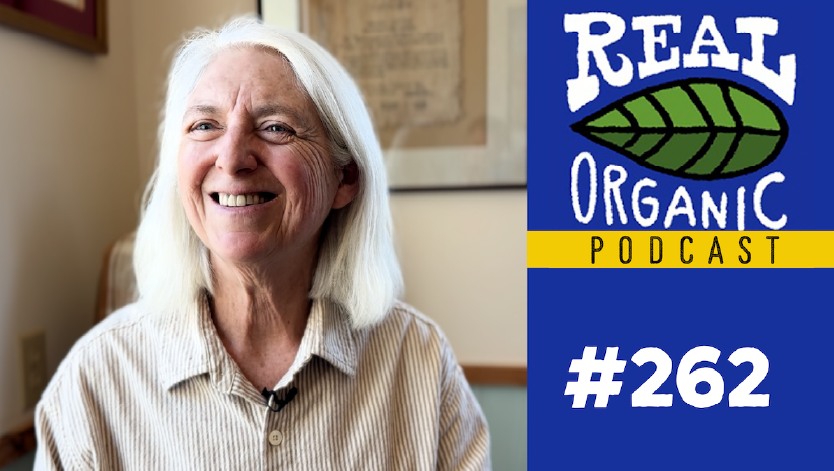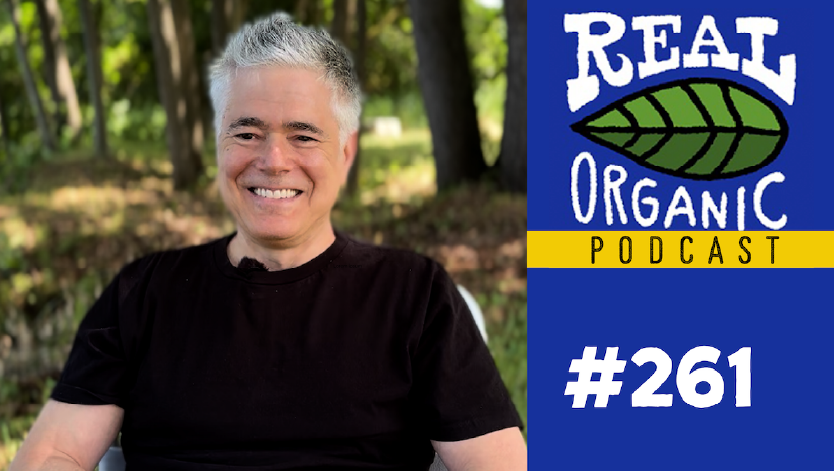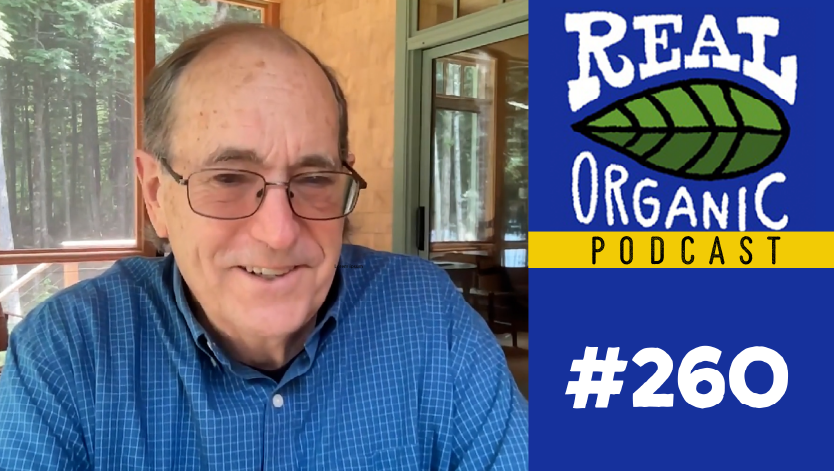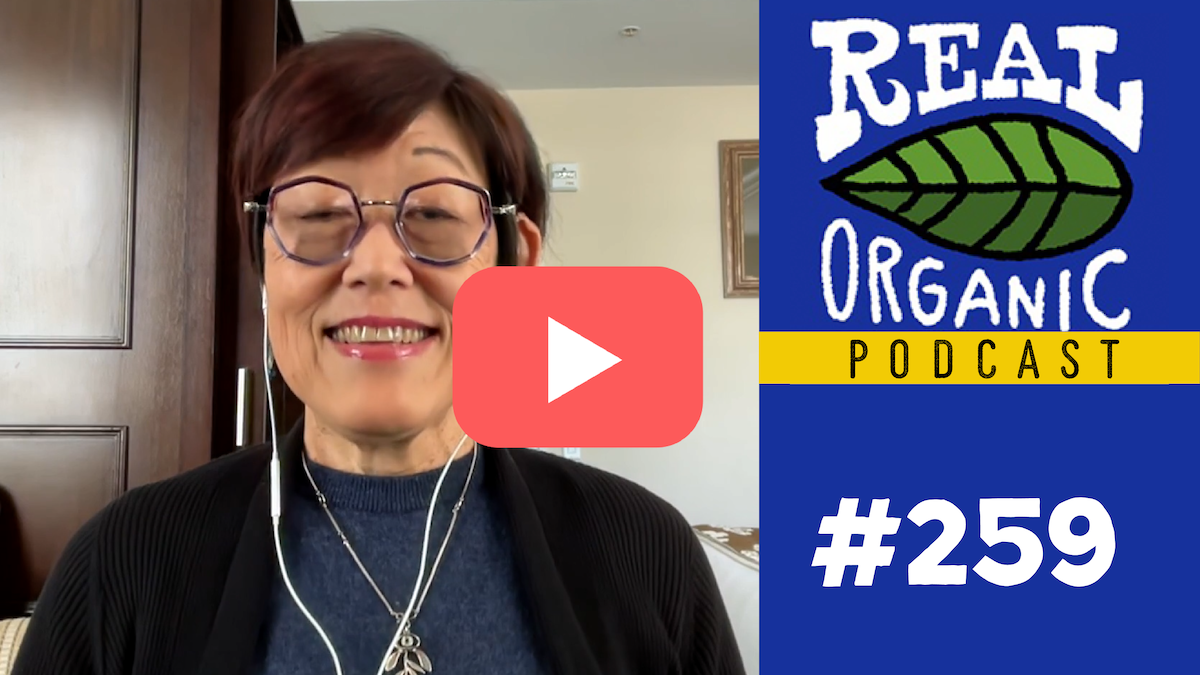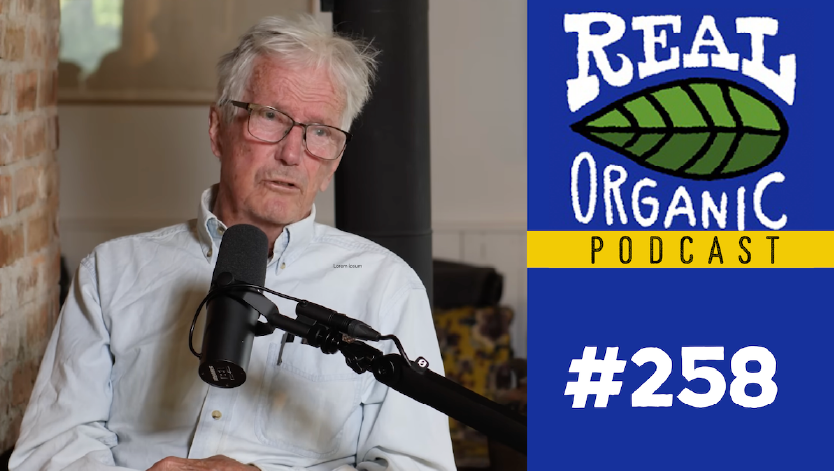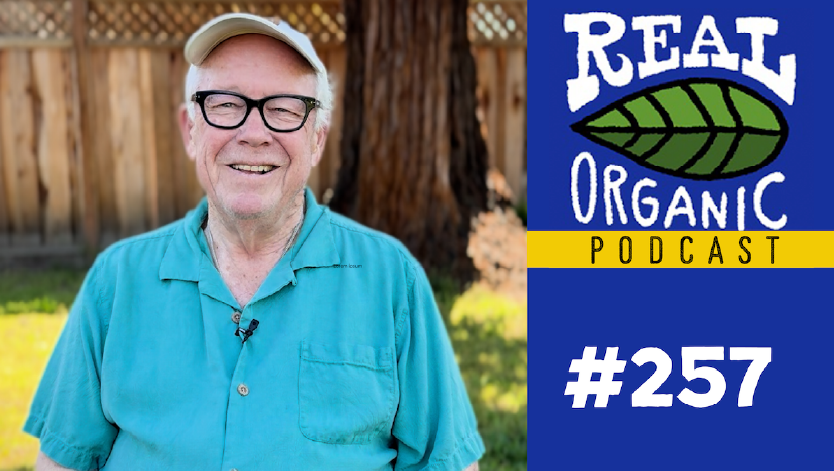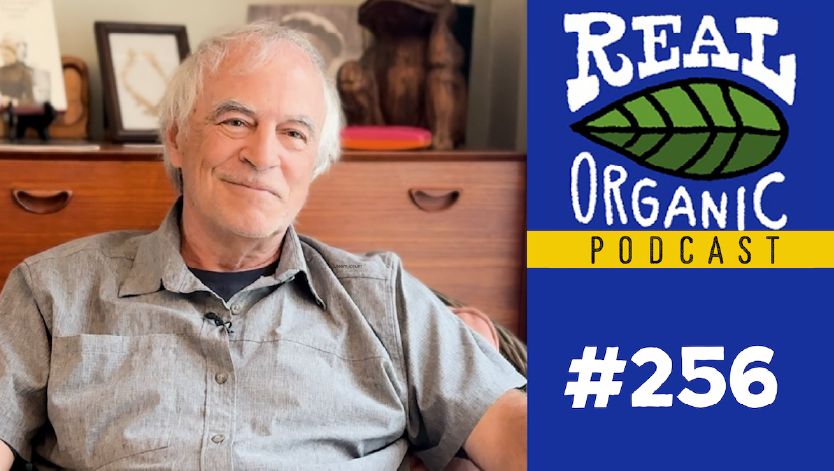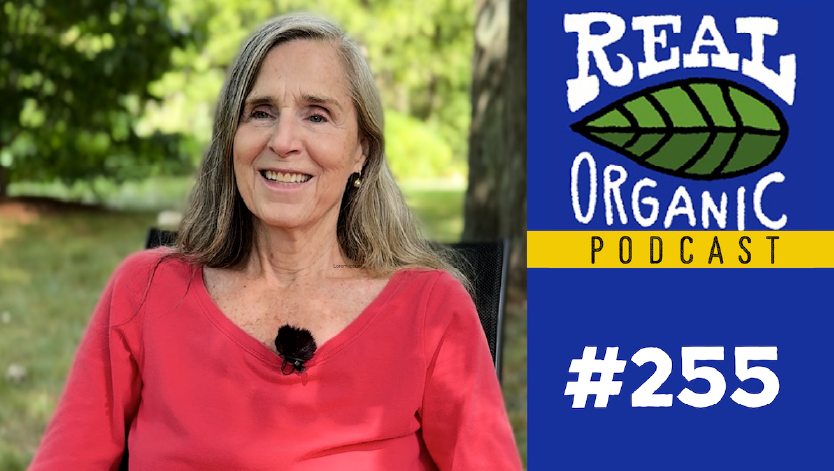Episode #166
Seth Godin: No Society Thrives With Monopolies
Welcome! You can subscribe and download episodes of our show through your favorite podcast app.
You can also subscribe to receive the video version of each episode on our YouTube channel.
Our Seth Godin interview has been edited and condensed for clarity.
Dave Chapman interviews Seth Godin, 2023:
Dave Chapman 0:00
Welcome, everybody to the Real Organic Podcast. I’m pleased today to be talking to Seth Godin. This is my second chance to interview Seth. Seth has been a teacher of mine for a long time. Although I’ve only met him twice. I’ve read many of his books, my very favorite was What To Do When It’s Your Turn (and It’s Always Your Turn). I was privileged to be a student in the AltMBA, another one of the things that Seth has started in terms of online education, which I did with my son, and it was a really great thing that we shared together. You’ve been a bee in my bonnet for a very long time. So your latest books are Carbon Almanac and the Song of Significance: A New Manifesto for Teams. And both of these, to me feel like a shift, a changing gears, a stepping up, a going forward. And I don’t think they’re a departure. But they seem like an acceleration perhaps. Do you feel that way?
Seth Godin 1:07
I hope it’s like that, because I’m trying to make a difference and trying to use the trust and benefit of the doubt I have to make that happen. I need to clarify, I did not write the Carbon Almanac; I spent a year and a half as a volunteer organizing it full time. A nd 400 other people, 1900 other people in 40 countries all contributed. So I just want to make that clear. But yeah, we’re running out of time. And I think that as the industrial economy starts to shift away from 100 years of carbon-based consumption and waste, we’re starting to wake up and say “What is work even for? How can we be proud of the work we do? How can we accomplish more? And how can we do it in a way that pays tribute to everyone who came before us? ”
Dave Chapman 2:04
Yes.
Dave Chapman 2:06
We’re, we’re… I feel that I’m living in the collision of what has been in and what will be, and and what might be. And we see that things might get very grim indeed, and perhaps will, but the question is, how can we steer things? How can we steer the ship in a better direction? I listened to an interview with Kevin Kelly and Tim Ferriss. And Kevin talked about his “radical optimism.” And I actually found that to be extremely helpful. I don’t know that I’m particularly optimistic person. I’m, I’m hopeful. I think that’s a little bit different. But I’ve been trying that on for size. Does that fit for you? That idea of choosing to be optimistic?
Seth Godin 2:56
Well, Kevin’s been a dear friend for a long time. And the philosophical underpinnings of choosing to be an optimist make perfect sense. Because our attitude can’t change anything in the outside world other than us. If being a pessimist causes you to not contribute and to not generate opportunity, then it’s a trap. If being an optimist causes you to blindly do things that backfire, it’s also a trap. And so what I try to do is, imagine the arc of history, imagine that there will be a species here after I’m gone. And how can we bend that arc in a way that we are proud of? So yeah, we’ve.. I was born a year before the Cuban missile crisis in the year after the Berlin Blockade. The world has been in really tough spots for a long time. I grew up near Love Canal, the first giant, famous toxic waste dump in A merica. It’s not like the moment we have right now is one we’ve never seen before. But I do think being a clear-eyed optimist requires us to tell the truth about some of the consequences of what we’re dealing with.
Dave Chapman 4:16
Yeah, yeah. The last time we talked, we discussed the idea that the belief system that says the purpose of a corporation is to make money for its shareholders no matter what, you’ve rejected that idea. Do you think corporations are a necessary part of where we’re headed or do you think that that model of people working together is is going to fade away?
Seth Godin 4:51
I’ve no doubt that in my lifetime, and my kids’ lifetimes, corporations are still going to be the dominant force of productivity and creation of wealth and food and shelter. That’s… I don’t think that it’s up for a lot of debate. I think the question is, what does a corporation even do? What is it? Because there is no person that is the corporation. Corporations are assemblies of people. And those people can be influenced, and they influence each other. So when I was at Yahoo, I saw the seeds of their future being sown, because the entire sales force, I mean, there was a room in New York that had 60 people in it. And they had on their screen, the stock ticker, and they could see every single minute what Yahoo stock was trading for. And that was what they were focused on not serving the customer, not building anything of value, not trying to create connection. But every time that number went up, $1, they made $100,000. Why wouldn’t they watch that all day long? Well, there are other things, other sources of information, other proxies that can guide our days. So I’m guessing that you are paying attention to a lot of things that involve the carbon cycle and growth, more than you’re paying attention to the stock ticker, and your company’s stock price, because your company doesn’t have a stock price. And so your proxies are different. And we’re going to see organizations that wise up about what they should be measuring, and that will change their behavior.
Dave Chapman 6:33
Yeah. Do you think there’s a place… or, what is the place of regulatory reform in all that? You know, I’ve thought a lot about what you’ve said, about a new economy, an information economy, an economy of caring, a different kind of business leadership. And that makes perfect sense to me in my business. But then I sell my tomatoes to a market which is now owned by a handful of corporations. And that is probably 98 – 99% of where people get their food. And, and every time that a large company I sell to gets bought by an even larger company, things get worse. I see it so clearly. The choices of the customers go down, the quality of the food goes down, the conditions of the workers goes down. We all keep losing. So you know, back in the in the age of reform of when they passed the Sherman Antitrust Act, that was a time when amazingly, Congress – our government said, “You know, this is not good for democracy.” And they put a limit on it and that … I just saw an editorial the other day that said “Well, the question is, are the monopolies raising prices for consumers?” That seemed to be the only question they were asking. That wasn’t the right question.
Seth Godin 6:40
No, no, we’ve been borked. So this goes back a very long way. The Congress passed that bill not just because it was good for democracy, but it because it was good for capitalism. That… monopolies are actually a defect of capitalism, and that all the math of economics fall apart when there’s monopoly. And the legislative capture that has gone on is not good for consumers, or for producers, or for democracy. The thing that we have to understand is like, I’ve been to countries that have almost no regulation, I’m guessing you have as well. People who live in those places don’t say “we’ve got it made, there is no regulation, we can put DDT on anything we want. We don’t have to worry about this”, or that just it’s a free market. The free market doesn’t work if there isn’t a understood foundation for how we will be able to be trustworthy and trading with each other. And the desire of a few people to corner the market and to capture the judiciary as they go, I think has been shown over and over again by really smart economists, doesn’t end well, and it’s not sustainable. So my radical optimistic point of view is, as fewer and fewer people benefit from that, there will be more pressure to make it stop. One thing that has helped is technology, because it takes away the power of certain monopolies they would have had all the power. So you can corner the market in cars, but all of a sudden electric vehicles show up and suddenly you haven’t cornered the market, Yahoo can corner the market on the internet, but all of a sudden a different search technology shows up. So their corner on the market doesn’t last as long as it would have. That’s not to be too pollyannish about it, but I do think we have to talk about it and talk about it and talk about it. Because the purpose of culture is not to enable monopoly, the purpose of companies is to enable culture.
Dave Chapman 10:27
Okay, you you’ve written about Industrial Capitalism and Market Capitalism. Is that what we’re talking about here?
Seth Godin 10:37
Yeah. So Market Capitalism is very hard to argue against if side effects are accounted for. So if I go to the farmers market, and there’s eight people selling tomatoes, the person who has the best tomatoes for the money will sell all of them. And they can’t use any magical forces against the other seven tomato growers. They’re simply serving the market. Now, the side effects are important, because if the person who is winning is doing it by cheating, by not paying people fairly, by leaving toxic waste behind, then they’re hurting all of us. But what Market Capitalism says is “find a problem and solve it and if people want to pay for it, then both sides are going to benefit.” And where it falls apart is either when we fail to regulate side effects, or when monopoly shows up and basically says to the customer “you have no choice. This is the only one.” Because, you know, the Free Market People are happy to point out that the Soviet Union didn’t work, because that’s what they had. They had a monopoly. And a monopoly in phone service or a monopoly in tomatoes is the same thing, which is not good.
Dave Chapman 11:48
Yeah, yeah. I have felt for a long time that if, if every dairy display in the supermarket had a little video loop of literally where that milk came from, then the farms that I’m supporting would immediately become the national champions. And the problem would be how in the world do we supply this market? That’s not their problem at the moment, their problem is how in the world do we pay our bills this month? But… So, there’s a thing of transparency in there that’s critical and not easily regulated, and not easily dealt with.
Seth Godin 12:27
Well, I think, I mean, we can debate this, and it’s your show, so we’ll talk about whatever you want. But the problem with transparency, is that human beings prize convenience and price over everything. And so, even when they know that millions of children work in slave labor conditions to make Halloween candy, they still buy chocolate from Nestle’s and Hershey’s. And it’s not that they don’t know, it’s that they don’t want to know. And what we need is Community Action, which is what we do when we say “no, it’s not okay to employ a seven year old and to pay them $1.” And fortunately, we have that in many places, but we don’t have it in enough places. What we need to be able to say is “no, it’s not okay for you to dump that stuff in the Hudson River, that’s going right past my house.” And everything is downstream from everything else. So if we continue to raise the standards that the community has, companies are resourceful enough to still be able to make what they make. And when they’re not, then we’ll have to lower the standards. But in the meantime, I don’t think we should say, “just because you’ll make an extra nickel, we should make it okay for you to enslave some seven year old.”
Dave Chapman 13:48
Yeah. You said, I thought very well, that more impactful, in terms of the climate, than buying an electric car would be to organize a small group and ban gas-powered leaf blowers in your town. And I think that’s an important distinction.
Seth Godin 14:10
Right.
Dave Chapman 14:11
Can you tell the story of Carbon Footprint, because I had never heard that before.
Seth Godin 14:16
It blew me away when I learned this. I mean, I worked on the book because I didn’t know stuff. I wrote my first blog post about the climate 15 years ago, and it didn’t solve the problem. And I found myself not talking about it very much because I didn’t feel informed. And I thought if I don’t feel informed, I bet other smart people don’t feel informed. Carbon Footprint, which we’ve all heard of, was invented by Ogilvy and Mather, one of the giant ad agencies, for British Petroleum in the 1980s. British Petroleum hired them to come up with one of the greatest marketing slogans of all time – to make intelligent rich people feel like hypocrites. Because if YOU feel like your Carbon Footprint is out to control, how dare you take any action on other people? “Clean your own house first.” That was what Carbon Footprint was saying. And what they knew, is that people in the breach would have trouble doing that. And so when we see plastic recycling promoted, we should come to the conclusion that it actually makes us feel better, but it doesn’t recycle any plastic at all. Because, from a physics point of view, it’s almost impossible to recycle mixed plastic. That when we see our neighbor using a leaf blower that’s gas powered, one carbon footprint side effect is “oh, well, I don’t have an electric car yet, so I shouldn’t say anything.” But the fact is, an hour of a leaf blower does as much damage to the climate as driving a pickup truck from New York to Los Angeles…That my neighbor, who just bought an electric car, also does three to four hours worth of leaf blowing a week, every week, for 15 weeks: that’s 60 trips in a pickup truck, to Los Angeles from New York. Well, he would have come out ahead if he hadn’t gotten the electric car and just stopped using a gas-powered leaf blower. But beyond that, I still have to breathe his air. So what we need to do is say “I’m probably not going to get a change made at the Federal Level, probably not gonna get a coal plant shut down in Auckland, New Zealand. But what I might be able to do is get my town, which has 2,000 houses in it, to ban leaf blowers. And if a few towns do that, then the contractors, the lawn contractors say “I got an electric one anyway, I don’t care whether it’s banned or not, I’m electric now.” And this community action of establishing a standard is totally doable. But the oil companies don’t want us to do that.
Dave Chapman 16:52
No. We become overwhelmed with what we should do. I was giving a talk once at a rally and somebody in the audience called out “what should we do?” And we were talking about the the failure of the National Organic Program to do its job and what that meant. And honestly, Seth, I was horrified. I didn’t have an answer. And I thought about it a lot since then. But but my answer was “we’ll send a letter to the USDA” and I thought what a terrible answer, because I’ve sent many letters to the USDA and I understand that it really doesn’t matter. Not one letter, not not even 1,000. Well, what would your answer have been?
Seth Godin 17:38
Well, I guess, because I don’t know the details of the organic program, you’re talking about. The key, every change that gets made in our culture gets made from the grassroots, never from the top down, never. That you get ahead in certain bureaucracies in the government by following the grassroots, not by causing it to change. So if we think about something universal, like gay marriage. Gay marriage didn’t happen because the Supreme Court woke up one day and decided to make gay marriage legal. It happened in city halls in communities one step at a time. And so when I think about, you know…there are two farmers markets I visit most weeks: the farmers market in my town, and the farmers market in New York City. The Green market in New York City has much-stricter rules about where stuff has to be grown and how it’s grown. That you can go to the farmers market in my town and buy shrimp and salmon from the fish guy, and plenty of my neighbors think that somehow magically the shrimp are growing in the Hudson River. I don’t know how they think that occurs, but they do. And, so we can organize how the farmer’s market does things. We can organize how the locally-owned supermarket chain does things, we can organize how Whole Foods does things. So Whole Foods doesn’t permit food with potassium sorbate to be sold. Well, I gotta guess this potassium sorbate lobbyists aren’t happy with that. But if you’re a manufacturer and you can’t sell your stuff in Whole Foods, let’s get rid of potassium sorbate, you can get rid of it everywhere. So, we find somebody in the chain who has to listen to 100 of us, or 1,000 of us, because that’s all it takes. And then the rules start to shift. Because in the grassroots people want to pile on to something that matches their question: “What do we do now?” Right? Well, that’s what the plastic recycling folks did. Unfortunately, they weren’t on the good side. But they figured out how to get one town after another to add those blue bins, until finally, culturally, you feel stupid throwing a plastic bottle into the garbage. I do that now. Because I want to feel stupid – because I need to not buy plastic bottles, not say “Oh, it’s okay. I’ll just recycle it.” Because I know, in where I live, they’re just gonna pick it up and burn it anyway.
Dave Chapman 20:03
Okay. Okay. All right, this is great. I want to go to education, but I want to visit just for a minute… I read The Song of Significance with a lot of different parts speaking inside. And I love what you’re saying about leadership, as opposed to this industrial model. And I’m fascinated by your description of Taylorism and when Frederick Taylor, you know, met Henry Ford, and that was kind of the beginning of the Industrial Age right there. The meeting of those two people, with oil having been really discovered in Texas the year before. 1911, I think we’re talking about. But it’s funny, because as a small farmer, I have always looked carefully at my own body’s efficiency, and the people I work with, and how do we do this faster, and easier and better. And I go, “Well, I’m really coming to this like Taylor.” But our farm is not, it’s not like the Ford factory.
Seth Godin 21:21
No, but there’s nothing wrong with coming at it like Taylor – and this is, this is a really important distinction. Okay. So, in the book I talk about the Aravind Eye Hospital. The Aravind Eye Hospital has restored the eyesight of more people than live in New York, Chicago and Los Angeles put together. And if you go there, you either pay $130, or you pay zero, and it’s totally up to you – you pick. Either way, your cornea surgery will be performed beautifully, with an infection rate lower than in London, England, even though you’re in rural India, where this is happening. There are two kinds of processes that go on in Aravind. If you are on the… if you have a scalpel, if you are in the operating room, you are following instructions to the letter. You are being followed by somebody who understands every single move because they don’t want you to make up a new way to do eye surgery! You just need to be a cog in the system. On the other hand, if you are changing the sheets, greeting the patients when they wake up in the recovery room, dealing with people in reception, your job is to be human. Your job is to make somebody feel seen and respected and comforted in a way that needs to be made up on the spot, because that is human work. And so when I think about harvesting, growing and harvesting tomatoes, a lot of what people who work for you do is basically pre-automated machinery. These are human beings who are doing something just because we haven’t figured out how to get a robot to do it yet. We need work like that. There’s nothing wrong with it. It feeds us. But at the same time, Dave has to wake up and say, “What should I talk about on my podcast this week?” You have to figure out how to find a different place to sell your tomatoes. You have to figure out which breed you should be planting next year – you and the people you hire to make human decisions where we don’t know the answer yet. And what I’m arguing in the book is not that manufacturing is dead. It’s just not growing the way it used to. Because most jobs where we write down what needs to be done, we’re gonna find an AI or robot to do it. What is growing is judgment. And connection, and things that people would miss if they were gone. So we need both. And you’ve just got to know when you’re hiring somebody or managing somebody which one are you hiring for right now?
Dave Chapman 24:02
Okay, that’s beautiful, thank you. Because I have had murk there. Just to finish that, and then I want to go to soft skills and real skills, is a book that I’ve loved is Atul Gawande’s book, The Checklist Manifesto. You would say “yes, I would embrace that book for the kind of work for where that is appropriate.”
Seth Godin 24:26
Yeah, I’m glad it exists. I mean, I wouldn’t be able to live my life without it.
Dave Chapman 24:30
Okay. Okay. I get a little confused in there. All right. So, real skills, and this this leads directly to education, and learning. We have to say that when we use the word educatio in our culture, we often don’t mean learning. And it is this thing that you go through and you get, you check the checklist, and you get, you get approved. You get accepted. But learning is different and it does not require formal education, but there’s a process of education when you’re learning. You said in the book, and you’ve said it before, that you believe that the real skills, and you said what is called soft skills, which are… when I read the list of skills I said “Yes, that is exactly who I want to work with, that is exactly who I want to hire. And if we have 10 of those people, we’re going to be ungodly successful.” So you also said you thought that they were teachable, not just learnable? Could you talk a little bit about that?
Seth Godin 25:38
So I got this from my friend, the late Zig Ziglar. And it’s pretty straightforward, I think. Some of the real skills are things like honest, enthusiastic, creative, charismatic, willing to lead, agreeable. These are things that we are looking for in a partner, in an employee, and in a boss. And what I would ask is, for any of those, is it possible with practice to become a little bit more honest? To become a little bit better at having a sense of humor? Become a little bit more agreeable? If you could do it a little bit more, then it’s a skill. It’s not something you’re born with. And that’s great news. It’s great news, because you’re not stuck with who you are, you could decide to practice that thing. Well, that’s just like juggling. Right? No one knows how to juggle until they adopt a posture that they want that skill. And so we use the word “talent” I think, way too much. Donald Bradman, the cricket player was talented – his hand eye coordination, like Ted Williams.. you and I have no chance, none. And, Bob Dylan won a Nobel Prize, but lots of people have written a song. Any one song that’s as good as any one song he wrote. So what we know is that it is possible to learn to do it, and you can do it more. And that, for me, fills me with hope and optimism. Because if we decide we could go do it.
Dave Chapman 27:23
So have you thought about how to do that? You’ve, you’ve done, I believe marvelous stuff in helping to promote, to develop online education. And I wouldn’t mind if you told the story of what your turning point was, with realizing that we had a long way to go. When you got… you only had whatever, a 92% dropout rate?
Seth Godin 27:57
Well, I think what you’re referring to is when they first started doing massive online education, the first big course was in artificial intelligence. 100,000 people signed up for it. And 1,000 people finished it. So they had a 99% dropout rate. And it struck me that that was gonna get worse, not better. So how could we build engagement online that would lead to emotional enrollment? Because if you can’t offer people a certificate the way Harvard can, why will someone go through the hard parts to get to the end? Because as soon as it gets hard, they just bounce. But it’s the moment when it’s hard, that we actually learn something. And what, when I built the AltMBA, which I don’t run anymore, I believe it – it wasn’t that we had a 93% dropout rate, instead, we had a 95% completion rate – that we created the conditions to completely flip the equation of who dropped out. How did we do it? We charged a lot of money and you didn’t get a refund if you stopped. So we activated sunk costs, we activated enrollment, we created group cohesion with cadres and membership groups within it. For a small group – they’re only like 50 people at a time, 100 people at a time, but you were in a group of 12 or 6. And if you didn’t show up, people would go find you and get you to come because they needed you. And that feeling creates the tension that gets us over the hump. And you were asking me about can the skills be taught, not just learned? And I think the answer is yes, but they require emotional enrollment. We have to have someone who wants to get somewhere because when they want to get there, then we can create the conditions for them to do it. But first, we have to find the people and communicate to those people what they get if they get this thing. And our society has so pushed convenience and consumption that we forgot to even inculcate in people. The goal, that’s something that you want.
Dave Chapman 30:19
Well, it seems that the, the way that you’ve sculpted the whole, the whole environment is designed to win over that emotional engagement. Have you… has your thinking evolved on that in the last five years?
Seth Godin 30:39
You know, I may be guilty of too much radical optimism about the internet, I am guilty. That at the beginning, Kevin, and me and the 500 other people who were there at the start, we looked at the net, and we said, this is going, “everyone’s going to get a microphone, there’s going to be way more leverage for so many people, things are gonna get better.” And I just didn’t account for trolls. I didn’t account for people who would profit from division. I didn’t account for misinformation, for fascism, and for the rest of it. And no one was listening to me anyway. So it’s not my fault. But I missed that. I think that what’s going to happen going forward, is we’re now suffering a huge whiplash, because the culture changed more in the last 15 years than in any 15 years in the history of the world. And usually, these changes take more than a lifetime. So by the time they happen, you’re dead. Now, they’ve happened while people are still in the same job. And so we’re looking at the fact that you used to be a copywriter, and now AI does mediocre copywriting. You used to be a book cover designer, and now AI does book cover design. All these things, combined with the fact that you and I are having this conversation 1000s of miles apart..impossible! We’re going to absorb it. A generation is now coming up, that has never lived a life where there weren’t smartphones. And that’s going to change so many things, hopefully for the better. But it definitely changes things because you and I remember what it’s like to not know something. Anyone who’s 21 years old has never lived in a world where it was possible to not know something.
Dave Chapman 32:28
Yeah it was. It was right there.
Seth Godin 32:33
Yeah, exactly.
Dave Chapman 32:36
Okay. Okay. Before we… are the courses working on real skills – are they flourishing? I know I saw them. And I haven’t noticed them for a while.
Seth Godin 32:48
So, two and a half years ago, at the beginning of COVID, when I was pretty sick, I said to my team “this is bigger than me.” And so we spun the whole thing off as a B Corp in the public interest. And so the Akimbo Workshops have now over the last two years, after running over and over again, faded to the history books, and the AltMBA persists and continues to thrive. The idea from the beginning was not that I would build an empire of online education, it’s that people would copy what I was doing. And that is what has been happening. The challenge of marketing and selling online education is complicated by the fact that we’ve got accredited institutions that pretend they do online education, but don’t really. And we got people like Masterclass that are just hyping something that might not be worth the money. And so to get your share in that space, has always been a challenge, and I knew that. But we ended up with more than 50,000 people going through the various workshops. And I’m really super proud of all of it.
Dave Chapman 34:01
Well, as an alumni, I can agree with you. I thought it was tremendous. Seth, I don’t want to eat up your day, we got a late start here. So I very much appreciate it.
Seth Godin 34:17
It’s an absolute delight. And I’m so proud of the work you do and I’m really grateful for your leadership.
Dave Chapman 34:23
And for me, for you, thank you so much.
Seth Godin 34:26
Thanks. Take care. All right.


